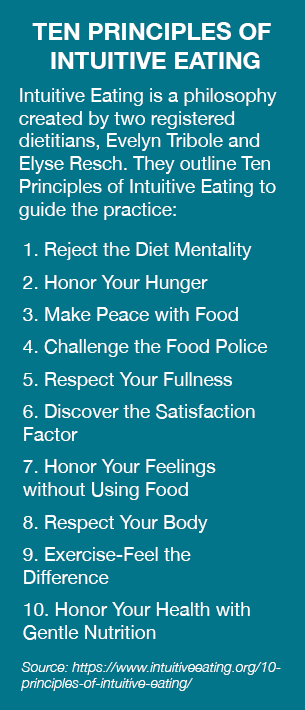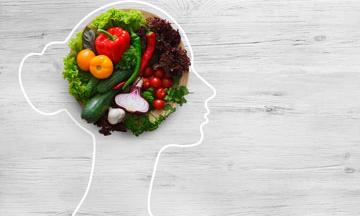It seems every year there’s a new fad diet that everyone is talking about. But recently non-diet approaches like “Intuitive Eating” or “Mindful Eating” have gained in popularity. What do these terms mean, and how do they work?


It seems every year there’s a new fad diet that everyone is talking about. But recently non-diet approaches like “Intuitive Eating” or “Mindful Eating” have gained in popularity. What do these terms mean, and how do they work?
Intuitive Eating is a “non-diet” approach to changing eating behaviors. It focuses on tuning into your body’s internal signals of hunger, fullness, and satisfaction as your guide to eating, instead of following external rules and restrictions on what, when, and how much to eat. This is different than Mindful Eating, which is more about the "how" of eating and being present at the table in a non-judgmental way.
Intuitive Eating is not a weight loss plan. Goals of Intuitive Eating may focus on mental health, emotional well-being, and other markers of physical health, but not on weight and body mass index (BMI).

Ultimately, Intuitive Eating aims to help you rebuild trust in yourself and your body and enjoy a new relationship with food.
Intuitive Eating can be helpful for “chronic dieters”—people who go on and off restrictive diets—or people who struggle with anxiety, guilt, or other negative feelings about food and eating.
That said, anyone can practice the principles of Intuitive Eating, even those with diabetes or other medical conditions. While some medical conditions, like allergies, may require restricting or eliminating certain foods or nutrients, some of the principles of Intuitive Eating can still be used in these situations to reduce food anxiety, keep eating pleasurable, and improve body image and self-esteem.
As always, talk with your health care team about your personalized nutrition plan.
Research on Intuitive Eating is still growing. Studies so far have associated Intuitive Eating with lower triglycerides, higher HDL cholesterol, lower blood glucose levels, and a lower BMI.
Research in people with diabetes is limited, but some early studies suggest that Intuitive Eating could help with blood glucose management as well.
The biggest benefits of Intuitive Eating may be related to mental health and wellbeing, especially for women. By removing the stress of following strict diets, Intuitive Eating can lead to higher self-esteem, less anxiety, depression and emotional eating, and improved body image.
Intuitive Eating removes food restrictions and allows you to be in the “driver’s seat” about your food choices. For some people, this may be freeing and relieve the pressure to follow certain rules. But others may feel lost without the guidance of a more structured eating plan.
Intuitive Eating may be somewhat controversial since it goes against conventional ideas of diet and weight loss as keys to improving health. You may need to find a Certified Intuitive Eating Counselor or other mental health care provider for additional support.
With diabetes, it’s still important to be aware of what you’re eating and monitor how different foods impact blood glucose.
But Intuitive Eating can help reduce anxiety and guilt around food choices by monitoring blood glucose and adjusting eating behaviors in a non-judgmental way. For example, instead of thinking “I can’t eat this,” an intuitive eater will think “my blood glucose doesn’t respond as well to this food” and adjust food choices as needed.
Like any lifestyle change, Intuitive Eating takes practice, commitment, and support. If you think Intuitive Eating may be right for you, consider seeing a Certified Intuitive Eating Counselor and Registered Dietitian Nutritionist. Search the Counselor Directory here.
Bonnie R. Giller is a Registered Dietitian Nutritionist, Certified Diabetes Educator and Certified Intuitive Eating Counselor. Learn more about Bonnie at BRGHealth.com. Find more Intuitive Eating tips on her blog.